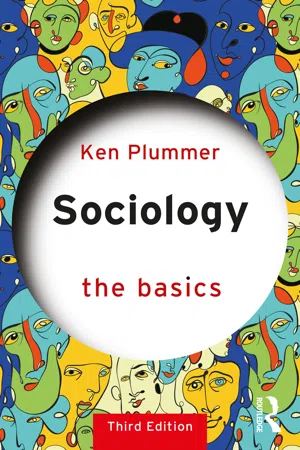
- 288 pages
- English
- ePUB (mobile friendly)
- Available on iOS & Android
About this book
A lively, accessible and comprehensive introduction to the diverse ways of thinking about social life, Sociology: The Basics has been translated into six languages. The volume is packed with thought-provoking summaries, questions, quotations and activities. It offers an absorbing narrative about what we mean by the social, and how we can think about it, weaving in discussions of the personal, the political and social change, along with concepts and vivid contemporary examples, and answering questions such as:
- What is the scope, history and purpose of sociology?
- How do we cultivate ways of understanding society and 'the social'?
- What is the state of the world we live in today?
- How do we analyse suffering and inequalities?
- What are key methods and tools for researching and thinking about society?
- How has digitalism reshaped sociology and its method?
- How might sociology help us understand the changes brought about by Covid-19?
- Does sociology have values?
- What is the role of sociology in making a better world?
In this thoroughly revised and updated Third edition the reader is encouraged to think critically about the structures, meanings, histories and cultures found in the rapidly changing world we live in. With tasks to stimulate the sociological mind and suggestions for further reading both within the text and on an accompanying website, this book is essential reading for all those studying sociology and those with an interest in how the modern world works.
Tools to learn more effectively

Saving Books

Keyword Search

Annotating Text

Listen to it instead
Information
1
IMAGINATIONS
ACTING IN A WORLD I NEVER MADE
Men make their own history, but they do not make it as they please; they do not make it under self-selected circumstances, but under circumstances existing already, given and transmitted from the past. The tradition of all dead generations weighs like a nightmare on the brains of the living.Karl Marx, The Eighteenth Brumaire of Louis Bonaparte, 2000 [1851]
THE SOCIOLOGICAL IMAGINATION AS CRITIQUE AND WONDER
The dark side of society: the miseries and sufferings of human social life
Always look on the bright side of life: the joys and potentials of human social life
Table of contents
- Cover
- Half Title
- Series Page
- Title Page
- Copyright Page
- Dedication Page
- Contents
- List of figures
- List of tables
- Social Hauntings
- Preface to the first edition
- Preface to the third edition
- 1 Imaginations: Acting in a World I Never Made
- 2 Theory: Thinking the Social
- 3 Societies: Living in the Twenty-First Century
- 4 History: Standing on the Shoulders of Giants
- 5 Questions: Cultivating Sociological Imaginations
- 6 Research: Critically Engaging with Empirical Truth
- 7 Trouble: Suffering Intersecting Inequalities
- 8 Vision: Creating Sociological Hope
- Conclusion: The Sociological Imagination: Twenty-One Theses
- Appendix: Epigrammatic Sociology
- Glossary
- Webliography
- Filmography: A Select Guide to Sociology and Film
- Select Bibliography
- Index
Frequently asked questions
- Essential is ideal for learners and professionals who enjoy exploring a wide range of subjects. Access the Essential Library with 800,000+ trusted titles and best-sellers across business, personal growth, and the humanities. Includes unlimited reading time and Standard Read Aloud voice.
- Complete: Perfect for advanced learners and researchers needing full, unrestricted access. Unlock 1.4M+ books across hundreds of subjects, including academic and specialized titles. The Complete Plan also includes advanced features like Premium Read Aloud and Research Assistant.
Please note we cannot support devices running on iOS 13 and Android 7 or earlier. Learn more about using the app